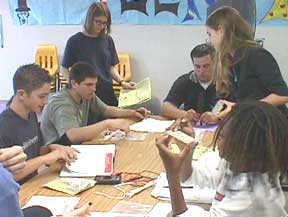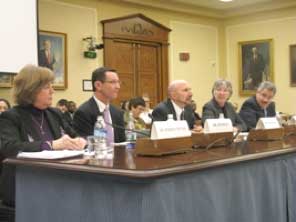Personal and Professional Engagement in Education Policy: Roles of Individuals and the American Physical Society
Noah Finkelstein, University of Colorado Boulder
In the late 1990’s while at the University of California, two students with whom I worked closely in physics classes and community-based programs approached me both to celebrate our successes in building thriving educational programs in physics and to let me know they would likely have to leave school. Recent federal legislation would force them to pay out-of-state tuition, despite their living almost their entire lives in California; they were not eligible for federal financial aid. Their parents had brought them as infants to U.S for a better life; however, a system that once supported undocumented immigrants shifted to exclude these remarkable students. They informed me about moves to create a state response and helped build what would become the DREAM Act.
While I was busy building and studying programs to support all students’ access to, engagement with, and success in doing physics, larger structures were at work that impacted my (and our collective) abilities to achieve these goals. I began to realize our classroom and community-based work in physics do not sit in isolation but were deeply connected to broader social and political enterprises. This coupling is even yet more apparent today.

An afterschool science program built with university students
From this understanding, I started to argue (to whomever would listen) that higher education is one of the essential forms of infrastructure for the welfare of both individuals and our society. While the dominant rhetoric around the benefits of higher education is about workforce development, the role of education is far greater. It empowers individuals – supporting healthier, longer, enriched, more community-based lives. It simultaneously empowers our society as the locus of knowledge generation and curation, a locus of cultural knowledge and advancement. But what had stood for many decades as a social, collective good, has shifted to being considered a private personal opportunity and commodity. The burden of paying for schools has shifted from the collective to the individual, and commensurately, the value and worth of higher education is being challenged.
Making the case for, engaging in, and fostering this essential social and individual good, sits at the intersection of science, policy, and education.
Disciplinary societies, including the American Physical Society, and their members have an opportunity and obligation to advance educational policy. We matter. Of course APS has a large constituency of roughly 50,000 members. We are distributed across the country which allows us, should we engage, to reach all members of congress, as well as state and local legislatures. Finally, we have unique and valuable perspectives from within the disciplines – The domain of physics has been, and ought remain a key tool for advancing our society; simultaneously, we are the ones grounding our work in the classrooms, laboratories, and research labs in manners that contextualize and personalize the larger scale perspectives (that can otherwise remain generic).
Of course, when done best, this policy work occurs in collaboration other professional organizations (such at AAU, APLU), societies, and stakeholders.
The APS has longstanding history of such involvement and engagement and I encourage your participation. It was based on calls from the Education and Diversity office of APS that I stepped up in the early 2000’s to work with my US Congressional delegation advocating for retaining (if not increasing) funding for the National Science Foundation; notably the Education and Human Resources division was under threat of being entirely eliminated. Answering this call for action, I engaged in regular interactions with my congressional staff that started with cold-calls. As a result, a bipartisan group of senators offered a written statement and oral testimony to the Senate about the value of STEM education and evidence-based instructional practices that have been supported by NSF, and spoke about their grave concerns about funding. This was prior to and may have helped the establishment of 2007 America COMPETES Act which sought to enact the calls of the National Academies’ report Rising Above the Gathering Storm.
Following, with lead APS staff (Ted Hodapp and Monica Plisch (APS education), Frances Slakey, Tyler Glembo and later Greg Mack (OGA)), we worked in concert with the White House Office of Science arguing for both pragmatic actions and lofty ideas, such as investing billon dollar scale funds to establish regional centers to advance our STEM education infrastructure. We simultaneously, partnered with the US Department of Education to place interns and fellows to support a push for STEM education that the Department was understaffed for. All of these approaches were designed to create federal support for the educational efforts and programs we have shown to work in physics.
In parallel efforts, I spent time working with the House Science, Space and Technology Committee during the COMPETES reauthorization of 2010. I invoked and shared the significant impacts of the physics education research community to argue for evidence-based practices. Through this committee work, we successfully secured increased funding for graduate fellowships, revived a key postdoc program, and broadened the funding base for NSF’s EHR. That was just the Committee outcomes however… Learning a lesson that politics can undermine policy, most of the innovative approaches of the bill were scuttled on the House floor.
As such, we adapt.

2010 Congressional Testimony on the America COMPETES Act
While remaining involved in and arguing for action at the federal level, we appear to be in a new landscape where the current climate is not one of central, federally driven policies, despite their history of seeding great advances in higher education and science. Now is more of a time to engage in strategic regionally based work that collectively adds to and supports productive federal action. And, indeed, unfortunately, we must engage in collective work to stave off bad federal policies. A remarkable recent example is contributing to maintained status of tax-free graduate stipends. I’m so proud of the thousands of APS constituents, including many of the graduate students I work with, who called, emailed and petitioned their representatives; I’m very grateful and impressed with the tireless efforts to the APS staff and offices (Slakey and Mack) who empowered our community to make this difference.
While we adapt to the changing goals and processes of engagement, one thing that remains is the power and impact of the American Physical Society.
APS provides a host of ways to get involved. http://www.aps.org/policy
There is no effort that is too small… and of course there are grand efforts — there are a variety of federal reauthorizations under way, the Higher Education Act and America COMPETES Act, both of which have significant impacts on physics and education. Locally, because of successful work from APS members and staff, Title II funds are potentially available for the remarkable work in education that APS has developed (such as PhysTEC ) — these are now local decisions, where you can influence your state on gaining access to these federally allocated funds.
What are your issues? It sounds like it is time to work on the DREAM Act once again. We must get and stay involved.
I encourage you to volunteer to work on policy priorities as outlined in the letter from Eric Brewe, the chair of the education policy committee, or to consider joining the education policy committee, or provide the committee suggestions of areas to work on.
Noah Finkelstein is a professor of physics, and co-Director of the Center of STEM Learning at the University of Colorado Boulder. He is actively involved in education policy with the American Physical Society, Association of American Universities, Association of Public and Land-grant Universities, the Higher Learning Commission, and the National Academies.
Disclaimer – The articles and opinion pieces found in this issue of the APS Forum on Education Newsletter are not peer refereed and represent solely the views of the authors and not necessarily the views of the APS.
